新概念英语第一册95课课文
新概念英语第一册95课课文
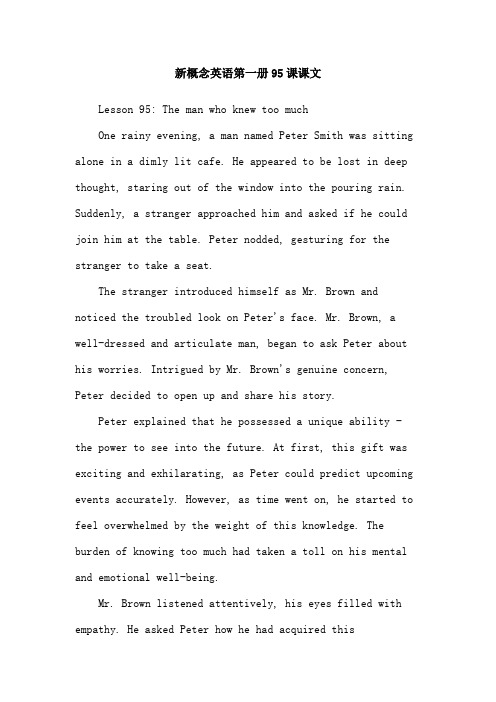
新概念英语第一册95课课文Lesson 95: The man who knew too muchOne rainy evening, a man named Peter Smith was sitting alone in a dimly lit cafe. He appeared to be lost in deep thought, staring out of the window into the pouring rain. Suddenly, a stranger approached him and asked if he could join him at the table. Peter nodded, gesturing for the stranger to take a seat.The stranger introduced himself as Mr. Brown and noticed the troubled look on Peter's face. Mr. Brown, a well-dressed and articulate man, began to ask Peter about his worries. Intrigued by Mr. Brown's genuine concern, Peter decided to open up and share his story.Peter explained that he possessed a unique ability - the power to see into the future. At first, this gift was exciting and exhilarating, as Peter could predict upcoming events accurately. However, as time went on, he started to feel overwhelmed by the weight of this knowledge. The burden of knowing too much had taken a toll on his mental and emotional well-being.Mr. Brown listened attentively, his eyes filled with empathy. He asked Peter how he had acquired thisextraordinary ability. Peter revealed that it was a result of a near-death experience he had as a child. Since then, visions of future events had appeared to him in dreams and as flashes in his waking moments.Deeply intrigued, Mr. Brown shared that he was a psychologist specializing in paranormal phenomena. He offered to help Peter find a way to cope with his gift and shared stories of other individuals who had faced similar challenges. He assured Peter that he was not alone and that there were ways to manage the overwhelming knowledge of the future.As their conversation continued, Peter felt a sense of relief and hope. He realized that he did not have to bear the burden of his gift alone. With Mr. Brown's guidance and support, Peter could learn to accept and control his ability, rather than allowing it to control him.Days turned into weeks, and Peter started to implement the coping strategies suggested by Mr. Brown. He began to meditate regularly, which helped him channel his thoughts and emotions. Through meditation, Peter learned to quiet his mind and find moments of peace amidst the chaos of his visions.Over time, Peter's mental and emotional well-being significantly improved. He was no longer consumed by the constant flood of future events. Instead, he used his gift to help others, offering guidance and support to those in need.Peter's story spread, and he became known as 'The Man Who Knew Too Much.' People from all walks of life sought his advice and comfort. Peter realized that his gift was not a curse but a unique opportunity to make a positive impact on the world.In the end, Peter Smith's journey of self-discovery taught him that even extraordinary abilities can be harnessed for good. His perseverance and the support he received from Mr. Brown helped him transform his burden into a source of strength and purpose.。
新概念英语第一册课文(全中文)
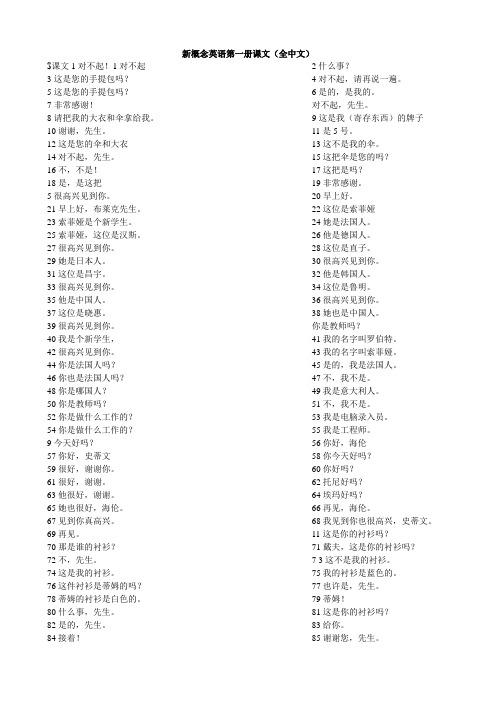
新概念英语第一册课文(全中文)$课文1对不起!1对不起2什么事?3这是您的手提包吗?4对不起,请再说一遍。
5这是您的手提包吗?6是的,是我的。
7非常感谢!对不起,先生。
8请把我的大衣和伞拿给我。
9这是我(寄存东西)的牌子10谢谢,先生。
11是5号。
12这是您的伞和大衣13这不是我的伞。
14对不起,先生。
15这把伞是您的吗?16不,不是!17这把是吗?18是,是这把19非常感谢。
5很高兴见到你。
20早上好。
21早上好,布莱克先生。
22这位是索菲娅23索菲娅是个新学生。
24她是法国人。
25索菲娅,这位是汉斯。
26他是德国人。
27很高兴见到你。
28这位是直子。
29她是日本人。
30很高兴见到你。
31这位是昌宇。
32他是韩国人。
33很高兴见到你。
34这位是鲁明。
35他是中国人。
36很高兴见到你。
37这位是晓惠。
38她也是中国人。
39很高兴见到你。
你是教师吗?40我是个新学生,41我的名字叫罗伯特。
42很高兴见到你。
43我的名字叫索菲娅。
44你是法国人吗?45是的,我是法国人。
46你也是法国人吗?47不,我不是。
48你是哪国人?49我是意大利人。
50你是教师吗?51不,我不是。
52你是做什么工作的?53我是电脑录入员。
54你是做什么工作的?55我是工程师。
9今天好吗?56你好,海伦57你好,史蒂文58你今天好吗?59很好,谢谢你。
60你好吗?61很好,谢谢。
62托尼好吗?63他很好,谢谢。
64埃玛好吗?65她也很好,海伦。
66再见,海伦。
67见到你真高兴。
68我见到你也很高兴,史蒂文。
69再见。
11这是你的衬衫吗?70那是谁的衬衫?71戴夫,这是你的衬衫吗?72不,先生。
7 3这不是我的衬衫。
74这是我的衬衫。
75我的衬衫是蓝色的。
76这件衬衫是蒂姆的吗?77也许是,先生。
78蒂姆的衬衫是白色的。
79蒂姆!80什么事,先生。
81这是你的衬衫吗?82是的,先生。
83给你。
84接着!85谢谢您,先生。
$课文13一件新连衣裙86你的新连衣裙是什么颜色的?87是绿色的。
新概念英语第一册课文1-143
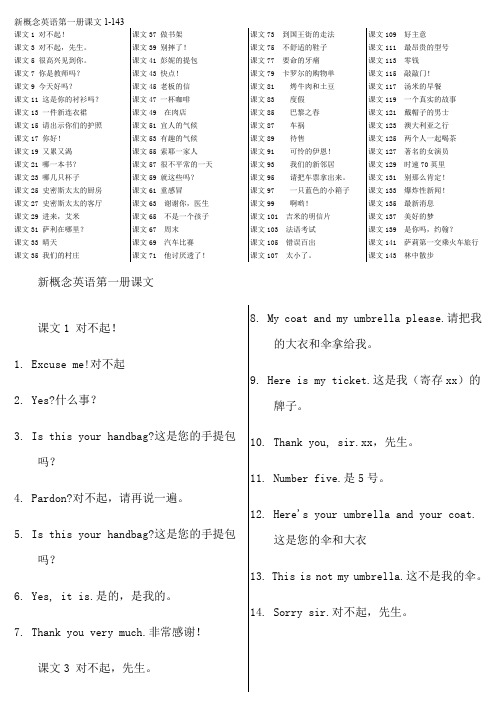
课文1 对不起!课文3 对不起,先生。
课文5 很高兴见到你。
课文7 你是教师吗?课文9 今天好吗?课文11 这是你的衬衫吗?课文13 一件新连衣裙课文15 请出示你们的护照课文17 你好!课文19 又累又渴课文21 哪一本书?课文23 哪几只杯子课文25 史密斯太太的厨房课文27 史密斯太太的客厅课文29 进来,艾米课文31 萨利在哪里?课文33 晴天课文35 我们的村庄课文37 做书架课文39 别摔了!课文41 彭妮的提包课文43 快点!课文45 老板的信课文47 一杯咖啡课文49 在肉店课文51 宜人的气候课文53 有趣的气候课文55 索耶一家人课文57 很不平常的一天课文59 就这些吗?课文61 重感冒课文63 谢谢你,医生课文65 不是一个孩子课文67 周末课文69 汽车比赛课文71 他讨厌透了!课文73 到国王街的走法课文75 不舒适的鞋子课文77 要命的牙痛课文79 卡罗尔的购物单课文81 烤牛肉和土豆课文83 度假课文85 巴黎之春课文87 车祸课文89 待售课文91 可怜的伊恩!课文93 我们的新邻居课文95 请把车票拿出来。
课文97 一只蓝色的小箱子课文99 啊哟!课文101 吉米的明信片课文103 法语考试课文105 错误百出课文107 太小了。
课文109 好主意课文111 最昂贵的型号课文113 零钱课文115 敲敲门!课文117 汤米的早餐课文119 一个真实的故事课文121 戴帽子的男士课文123 澳大利亚之行课文125 两个人一起喝茶课文127 著名的女演员课文129 时速70英里课文131 别那么肯定!课文133 爆炸性新闻!课文135 最新消息课文137 美好的梦课文139 是你吗,约翰?课文141 萨莉第一交乘火车旅行课文143 林中散步新概念英语第一册课文课文1 对不起!1. Excuse me!对不起2. Yes?什么事?3. Is this your handbag?这是您的手提包吗?4. Pardon?对不起,请再说一遍。
新概念英语第一册9596课课件

C. will be; will be D. is; will be
4. There ____D____ a dolphin show in the zoo tomorrow evening. A. was B. is going to have
C. will have D. is going to be
1.Students will go to school in the future.(一般疑问 句)W_i_ll s_tu_dents _g_o to school in the future. 2.There will be some robots in our homes.(改为否 定句)Therew_on_`t b_e _a_ny_ robots in our homes. 3.Everyone will have a small car.(对划线部分提问) W_h_at_w_ill everyone _ha_ve?
员
n. 站台 n. 大量 n. 火车 n. 车站,火车站 n. 酒吧 v. 赶上 n. 往返 v. 错过 n. 收票员,乘务
• return
• n. • 1) 往返 • return ticket • 往返票
• 2) in return • 作为回报
• You sent me a postcard, in return, I sent you a postcard too.
A. isn’t working
B. doesn’t working
C. isn’t going to working D. won’t work 3. He _D____ very busy this week, he ______
free next week.
新概念英语第一册第95课Lesson95课文单词知识点说课讲解

新概念英语第一册第95课L e s s o n95课文单词知识点精品资料【知识点讲解】1. 这一课我们来学习表达准确时间的说法。
首先时、分、秒的说法分别是:hour, minute, second;表达整点的说法很简单,可以直接说数字,或数字加o'clock 。
比如8点钟,可说It's eight. 或者 It's eight o'clock.Lesson95GEORGE: Two return tickets to London, please. What time will the next train leave?ATTENDANT: At nineteen minutes past eight. GEORGE: Which platform?ATTENDANT: Platform Two. Over the bridge. KEN: What time will the next train leave? GEORGE: At eight nineteen. KEN: We've got plenty of time.GEORGE: It's only three minutes to eight.KEN: Let's go and have a drink. There's a bar next door to the station.GEORGE: We had better go back to the station now, Ken.PORTER: Tickets, please.GEORGE: We want to catch the eight nineteen to London.PORTER: You've just missed it!GEORGE: What! It's only eight fifteen.PORTER: I'm sorry, sir. That clock's ten minutes slow.GEORGE: When's the next train? PORTER: In five hours' time! 乔 治:买两张到伦敦的往返票。
新概念英语第一册Lesson95-98课件
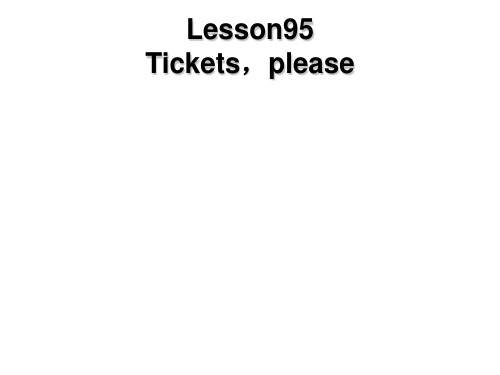
Lesson97
5 、 Is there a label on the case? Yes, there's a label on the handle with his name and address on it. 6、 Is the first case Mr. Hall's? No, it isn't. 7 、 What's Mr. Hall's address? It's 83, Bridge Street.
Lesson96
I had better stay here. We had better wait for him. You had better call a doctor. They had better go home. She had better hurry. You had better be careful.
Lesson97
8 、 Is that the address on the case? Yes, it is. 9、What's the matter with the case? The case doesn't belong to Mr. Hall
leave (left,left) describe zip label handle address pence belong
练习册p141 9:16 sixteen minutes past nine 7:34 twenty-six minutes to eight 12:01 one minute past twelve 15:09 nine minutes past three 1:56 four minutes to two 17:21 twenty-one minutes past five
新概念英语口语第一册Lesson95TravelingbyTaxi乘坐出租车
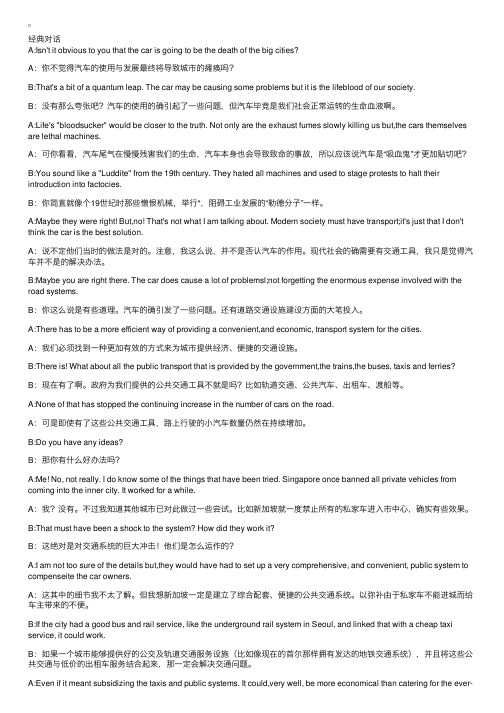
经典对话A:Isn't it obvious to you that the car is going to be the death of the big cities?A:你不觉得汽车的使⽤与发展最终将导致城市的瘫痪吗?B:That's a bit of a quantum leap. The car may be causing some problems but it is the lifeblood of our society.B:没有那么夸张吧?汽车的使⽤的确引起了⼀些问题,但汽车毕竞是我们社会正常运转的⽣命⾎液啊。
A:Life's "bloodsucker" would be closer to the truth. Not only are the exhaust fumes slowly killing us but,the cars themselves are lethal machines.A:可你看看,汽车尾⽓在慢慢残害我们的⽣命,汽车本⾝也会导致致命的事故,所以应该说汽车是“吸⾎⿁”才更加贴切吧?B:You sound like a "Luddite" from the 19th century. They hated all machines and used to stage protests to halt their introduction into factocies.B:你简直就像个19世纪时那些憎恨机械,举⾏*,阻碍⼯业发展的“勒德分⼦”⼀样。
A:Maybe they were right! But,no! That's not what I am talking about. Modern society must have transport;it's just that I don't think the car is the best solution.A:说不定他们当时的做法是对的。
新概念英语第一册课文(全中文)

新概念英语第一册课文(全中文)新概念英语第一册课文(全中文)$课文1对不起!1对不起2什么事?3这是您的手提包吗?4对不起,请再说一遍。
5这是您的手提包吗?6是的,是我的。
7非常感谢!$课文3对不起,先生。
8请把我的大衣和伞拿给我。
9这是我(寄存东西)的牌子。
10谢谢,先生。
11是5号。
12这是您的伞和大衣13这不是我的伞。
14对不起,先生。
15这把伞是您的吗?16不,不是!17这把是吗?18是,是这把19非常感谢。
$课文5很高兴见到你。
20早上好。
21早上好,XXX先生。
22这位是XXX23XXX是个新学生。
24她是法国人。
25XXX,这位是XXX。
26他是德国人。
27很兴奋见到你。
28这位是直子。
29她是日本人。
30很高兴见到你。
31这位是XXX。
32他是韩国人。
33很高兴见到你。
34这位是XXX。
35他是中国人。
36很兴奋见到你。
37这位是XXX。
38她也是中国人。
39很兴奋见到你。
$课文7你是教师吗?40我是个新学生。
41我的名字叫XXX。
42很高兴见到你。
43我的名字叫XXX。
44你是法国人吗?45是的,我是法国人。
46你也是法国人吗?47不,我不是。
48你是哪国人?49我是意大利人。
50你是教师吗?51不,我不是。
52你是做甚么事情的?53我是电脑录入员。
54你是做什么工作的?55我是工程师。
$课文9今天好吗?56你好,XXX57你好,XXX58你今天好吗?59很好,谢谢你。
60你好吗?61很好,感谢。
62XXX好吗?63他很好,感谢。
XXX好吗?65她也很好,XXX。
66再会,XXX。
67见到你真高兴。
68我见到你也很兴奋,XXX再会。
$课文11这是你的衬衫吗?70那是谁的衬衫?71戴夫,这是你的衬衫吗?72不,先生。
73这不是我的衬衫。
74这是我的衬衫。
75我的衬衫是蓝色的。
76这件衬衫是XXX的吗?77也许是,先生。
78XXX的衬衫是白色的。
79XXX!80甚么事,师长教师。
81这是你的衬衫吗?82是的,先生。
